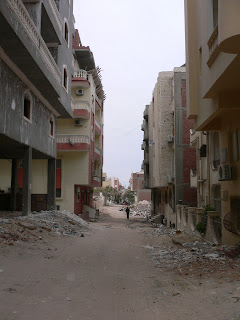
Location: Red Sea
Bottom time: 55 minutes
Depth: 3 meters
Visibility: 81 %
Red Sea is no doubt a diver's paradise. On a single dip, you may see dolphins, barracuda, lion fish, angel fish, grouper, flute fist, parrot fish, spotted eagle ray, and sea serpent. And if you get really lucky, a reef shark. There are about 1400 coral and fish species, many of which native only to Red Sea, world-famous wrecks like 2ndWW-Thistlegorm, great visibility, and there are a lot of different reef profiles; islands, walls, drifts, etc. To read on, you can pick any book on a given topic. However, you will now read a different diving story from rookie's point of view.
I love water, swimming, and marine life, and know nothing better than spending a day chillin' on a snorkling trip. After a couple of months and a dozen trips I considered myself an old hand in snorkling. I figured it would be a sin not to try out exploring the underwater world through the oxygen tube, or first stage, as the pro term goes, now that I had the prime opportunity.
I enrolled on a half-day intro course in a 5-star diving centre. First we were each given a plastic box full of equipment. I happily added the parts I already owned: silicone mask, Mares leak-proof snorkel, and a 5 mm Beuchat wetsuit. Then we watched a video, after which my head was spinning from the technical terminology, how to calculate the ratio of pressure and shrinkage of lungs, and the necessary paraphenalia: SPG, BCD, first and second stage, buoyancy, O-ring...
The next task was to put together the equipment. The oxygen bottle was rather heavy that I could hardly lift it. I wondered how it was physically possible to carry all the stuff in my back, with the weigth belt and all. We had to be very careful not to make the oxygen bottle tumble, lest it could explode. We had to wrench a little screw in order to test that the bottle was ok. Our instructor, Amir, was helping my fellow course member. He loosened the valve and – bang! There was a loud explosion sound, we were all in one piece, and he quickly managed to close the ring. No O-ring bottle for me, thank you, I will use the other system.
We filled and emptied the BCD (air vest), and practiced breathing through first and second stage (emergency oxygen supply). We learned the necessary communication signs to use underwater, and to read SPG (pressure gauge). We helped each other lift the bottles to our backs, and off we went from the shore, backwards, of course.
We held the air valve upwards, pressed the button that emptied the BCD, and descended 3 meters in the sea bottom. We had to keep popping our ears as we went, to stabilize the pressure. Amir signaled us our tasks, and one after another we repeated them, knelt in the seabed. First we practiced taking off the regulator from our mouth and putting in back again. Here is a simple test for you, who are thinking of taking the diving course: If the thought of being temporarily disconnected from your oxygen supply in sea bottom freak you out, then diving may not be meant for you.
When it was my turn, I removed the regulator, but had to get to the surface. The others waited for me, and the second time it worked. Then we emptied the mask by slightly lifting the underpart, and blowing air through the nose. Then we tried another technique, replacing the 1st stage with the emergency regulator. My mask had salty water inside, and I was freezing. My ears were sore and ringing from the pressure difference. We had been sitting at the bottom of the sea for almost one hour.
I did not become a diver, and am unsure if I would ever want to do the full 5-day open-water course required for PADI certificate. The thought of standing on the seabed in the depth of 15 meters did not become any more attractive to me. But who cares... I did it, and passed the intro course. My life motto is to try everything at least once in life, so here another landmark has been passed. However, somewhere deep inside of me still resides a little thought... maybe one day I'm going to repeat the course from the diving boat, gazing the diversity of the reef in hues of rainbow, and marveling the beauty of the lively, bright, multi-coloured fish that I have learned to love...










